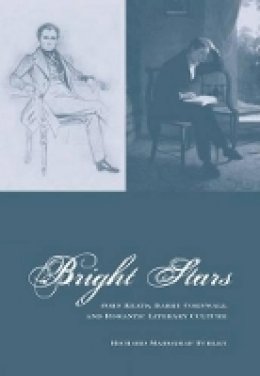
Stock image for illustration purposes only - book cover, edition or condition may vary.
Bright Stars
Richard Marggraf Turley
€ 31.58
FREE Delivery in Ireland
Description for Bright Stars
Paperback. Cornwall - pseudonym of Bryan Waller Procter (1787-1874) - published his first poems in the Literary Gazette in late 1817. This book explores the central question of how Cornwall's racy and politically subversive poetry managed to establish a broad readership where Keats' publications met with review hostility and readerly indifference. Series: Liverpool English Texts and Studies. Num Pages: 200 pages, 1 frontispiece. BIC Classification: 2AB; DSBF; DSC. Category: (G) General (US: Trade). Dimension: 234 x 155 x 11. Weight in Grams: 324.
If we could ask a Romantic reader of new poetry in 1820 to identify the most celebrated poet of the day after Byron, the chances are that he or she would reply with the name of ‘Barry Cornwall’. Solicitor, dandy and pugilist, Cornwall – pseudonym of Bryan Waller Procter (1787-1874) – published his first poems in the Literary Gazette in late 1817. By February 1820, under the tutelage of Keats’s mentor, Leigh Hunt, Cornwall had produced three volumes of verse. Marcian Colonna sold 700 copies in a single morning, a figure exceeding Keats’s lifetime sales. Hazlitt’s suppressed anthology, Select British Poets (1824), allocated Cornwall nine pages – the same number as Keats, and more than Southey, Lamb or Shelley; Blackwood’s Edinburgh Magazine pronounced Cornwall a poet of ‘originality and genius’; and in 1821, Gold’s London Magazine announced that in terms of ‘tenderness and delicacy’ even Percy Shelley was ‘surpassed very far indeed by Barry Cornwall’. It is difficult to square Cornwall’s early nineteenth-century popularity with his subsequent neglect. In Bright Stars Richard Marggraf Turley concentrates on Cornwall’s phenomenonal success between 1817 and 1823, emphatically returning an important and unjustly neglected Romantic author to critical focus. Marggraf Turley explores Cornwall’s rivalry – and at various junctures, political camaraderie – with fellow Hunt protégé Keats, whose career exists in a fascinatingly mirrored relationship with his own trajectory into celebrity. The book argues that Cornwall helped to structure Keats’s experience as a poet but also explores the central question of how Cornwall’s racy and politically subversive poetry managed to establish a broad readership where Keats’s similarly indecorous publications met with review hostility and readerly indifference.
Product Details
Format
Paperback
Publication date
2013
Publisher
Liverpool University Press United Kingdom
Number of pages
200
Condition
New
Series
Liverpool English Texts and Studies
Number of Pages
200
Place of Publication
Liverpool, United Kingdom
ISBN
9781846318139
SKU
V9781846318139
Shipping Time
Usually ships in 7 to 11 working days
Ref
99-1
About Richard Marggraf Turley
Richard Marggraf Turley is Professor of English Literature at Aberystwyth University.
Reviews for Bright Stars
Bright Stars raises intriguing questions about canon-formation and literary reception, about early nineteenth-century audiences and reading and reviewing practices, and about the poetry of one of the period’s most admired poets in English and one of its most neglected. It makes an important contribution to our understanding of Romantic literary culture. Andrew Bennett Richard Marggraf Turley's study of the often neglected poet Barry Cornwall offers an interesting and informative supplement to the work of critics such as Jeffrey Cox and Nicholas Roe on the social, literary and invariably political contexts of John Keats's life and work. Philip Cox, Literature & History, Third Series 20/1
Literature & History, Third Series 20/1
Literature & History, Third Series 20/1
